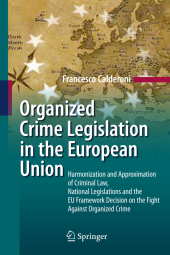 Neuerscheinungen 2014Stand: 2020-02-01 |
Schnellsuche
ISBN/Stichwort/Autor
|
Herderstraße 10
10625 Berlin
Tel.: 030 315 714 16
Fax 030 315 714 14
info@buchspektrum.de |

Francesco Calderoni
Organized Crime Legislation in the European Union
Harmonization and Approximation of Criminal Law, National Legislations and the EU Framework Decision on the Fight Against Organized Crime
2010. 2014. xiv, 189 S. 235 mm
Verlag/Jahr: SPRINGER, BERLIN; SPRINGER BERLIN HEIDELBERG 2014
ISBN: 3-642-42512-7 (3642425127)
Neue ISBN: 978-3-642-42512-7 (9783642425127)
Preis und Lieferzeit: Bitte klicken
Providing an unprecedented analysis of the national and European legislation on organized crime, this volume examines the policies and instruments involved. Highlights include inconsistencies in national approaches and issues with legal instruments.
Just a few months after the entry into force of the EU Framework Decision on the fight against organized crime, this book provides an unprecedented analysis of the national and European legislation on organized crime.
The book provides a critical examination of the European policies and legal instruments to promote the harmonization and approximation of criminal law in this field (including the United Nations Convention on Transnational Organized Crime).
The current level of harmonization among EU Member States and the approximation to the standards of the new Framework Decision are discussed in detail, with the help of tables, graphs and maps.
The results highlight the problems surrounding the international legal instruments and the inconsistencies of the national approaches to combating organized crime.
Harmonization and Approximation Policies in the European Union.- Organized Crime Legislation: Reasons and Background for the Assessment of Harmonization and Approximation.- The Methodology.- Assessing Harmonization: The Horizontal Analysis.- Assessing Approximation: The Vertical Analysis.- Conclusions and Implications.
From the reviews:
"...this book offers an innovative perspective and methodology which can be extremely useful to all those who study organised crime... Calderoni manages to bring out the complex paradox within this field, which has allowed the Member States to keep their national legal differences under the apparent veil of an EU common understanding. Such results underline a previous lack of analysis of the field, not only on the side of academics, but also on the side of policymakers. In this sense, Calderoni´s book constitutes a valuable cornerstone for future research on the development of EU criminal law and its potential consequences for society." ( Helena Carrapico, Global Crime, p. 233 )


